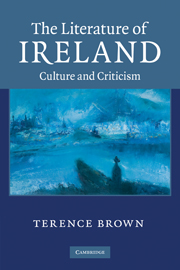Book contents
- Frontmatter
- Contents
- Acknowledgements
- Introduction
- 1 The Literary Revival: historical perspectives
- 2 Joyce's magic lantern
- 3 Music: the cultural issue
- 4 Modernism and revolution: rereading Yeats's ‘Easter 1916’
- 5 Shakespeare and the Irish self
- 6 Irish literature and the Great War
- 7 Ireland, Modernism and the 1930s
- 8 Post-modernists: Samuel Beckett and Flann O'Brien
- 9 Patrick Kavanagh: religious poet
- 10 MacNeice's Irelands: MacNeice's islands
- 11 Louis MacNeice and the Second World War
- 12 MacNeice and the puritan tradition
- 13 John Hewitt and memory: a reflection
- 14 Michael Longley and the Irish poetic tradition
- 15 Seamus Heaney: the witnessing eye and the speaking tongue
- 16 Derek Mahon: the poet and painting
- 17 Telling tales: Kennelly's Cromwell and Muldoon's ‘The More a Man Has the More a Man Wants’
- 18 Redeeming the time: John McGahern and John Banville
- 19 ‘Have we a context?’: transition, self and society in the theatre of Brian Friel
- 20 Hubert Butler and nationalism
- 21 The Irish Dylan Thomas: versions and influences
- Index
- References
7 - Ireland, Modernism and the 1930s
Published online by Cambridge University Press: 05 June 2012
- Frontmatter
- Contents
- Acknowledgements
- Introduction
- 1 The Literary Revival: historical perspectives
- 2 Joyce's magic lantern
- 3 Music: the cultural issue
- 4 Modernism and revolution: rereading Yeats's ‘Easter 1916’
- 5 Shakespeare and the Irish self
- 6 Irish literature and the Great War
- 7 Ireland, Modernism and the 1930s
- 8 Post-modernists: Samuel Beckett and Flann O'Brien
- 9 Patrick Kavanagh: religious poet
- 10 MacNeice's Irelands: MacNeice's islands
- 11 Louis MacNeice and the Second World War
- 12 MacNeice and the puritan tradition
- 13 John Hewitt and memory: a reflection
- 14 Michael Longley and the Irish poetic tradition
- 15 Seamus Heaney: the witnessing eye and the speaking tongue
- 16 Derek Mahon: the poet and painting
- 17 Telling tales: Kennelly's Cromwell and Muldoon's ‘The More a Man Has the More a Man Wants’
- 18 Redeeming the time: John McGahern and John Banville
- 19 ‘Have we a context?’: transition, self and society in the theatre of Brian Friel
- 20 Hubert Butler and nationalism
- 21 The Irish Dylan Thomas: versions and influences
- Index
- References
Summary
The annus mirabilis of literary Modernism was 1922, when Ulysses and The Waste Land were first published in two metropolitan centres, Paris and London. In Ireland, the year 1922 saw the founding of the Free State, a coincidence of chronology that ought to have stimulated more reflection than it has. For that moment when a national revolution achieved even a partial success represented an experiment in social and cultural expression just as the publication of those two works represented experiment in the artistic sphere. Each event, the founding of a post-imperial state, the publication of a novel which set in question the adequacy of realist fiction to the present moment and the issuing of the poem which sought to exploit a ‘mythical method’ the better to comprehend the ‘immense panorama of futility and anarchy’ of ‘contemporary history’ were symptomatic occasions, signs of the times, manifestions of, and reactions to, the general crisis of post-war Europe.
Ulysses and The Waste Land are of course customarily entered in the roll-call of Modernist masterpieces even by those who suspect that Modernism is so capacious a term, so ‘completely lacking in positive content’, that it is ‘the emptiest of all cultural categories’. The Irish revolution and the foundation of the Free State have not, by contrast, been considered in the context of the international Modernism of the period, however accommodatingly conceived.
- Type
- Chapter
- Information
- The Literature of IrelandCulture and Criticism, pp. 88 - 103Publisher: Cambridge University PressPrint publication year: 2010
References
- 1
- Cited by



